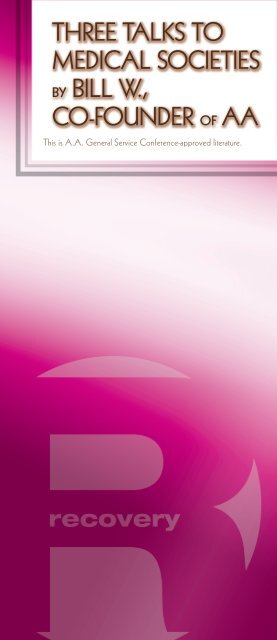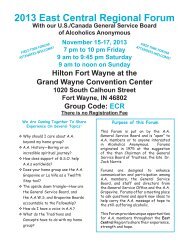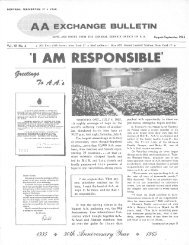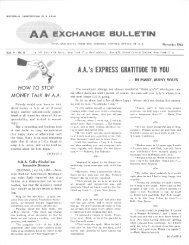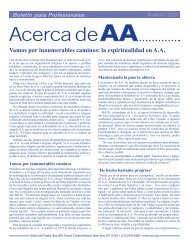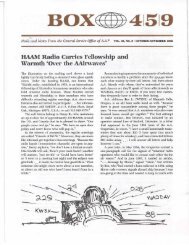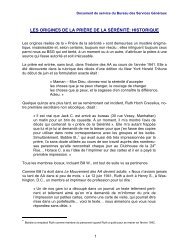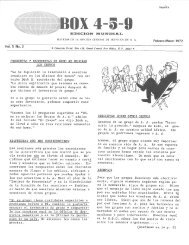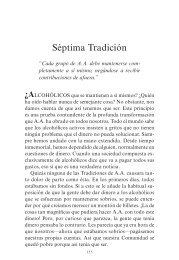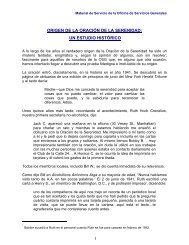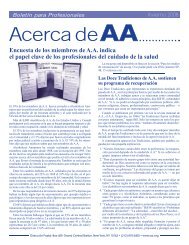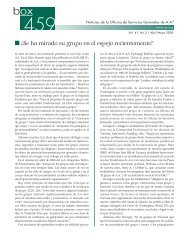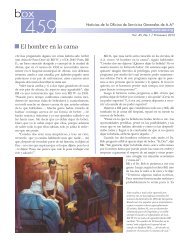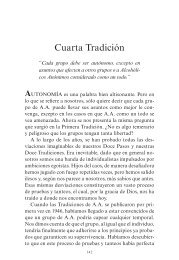Three Talks to Medical Societies by Bill W - Alcoholics Anonymous
Three Talks to Medical Societies by Bill W - Alcoholics Anonymous
Three Talks to Medical Societies by Bill W - Alcoholics Anonymous
Create successful ePaper yourself
Turn your PDF publications into a flip-book with our unique Google optimized e-Paper software.
ALCOHOLICS ANONYMOUS ® is a fellowship of men<br />
and women who share their experience, strength<br />
and hope with each other that they may solve<br />
their common problem and help others <strong>to</strong> recover<br />
from alcoholism.<br />
• The only requirement for membership is a<br />
desire <strong>to</strong> s<strong>to</strong>p drinking. There are no dues or fees<br />
for A.A. membership; we are self-supporting<br />
through our own contributions.<br />
• A.A. is not allied with any sect, denomination,<br />
politics, organization or institution; does not wish<br />
<strong>to</strong> engage in any controversy; neither endorses<br />
nor opposes any causes.<br />
• Our primary purpose is <strong>to</strong> stay sober and help<br />
other alcoholics <strong>to</strong> achieve sobriety.<br />
Copyright © <strong>by</strong> A.A. Grapevine, Inc.;<br />
reprinted with permission<br />
Copyright <strong>by</strong><br />
<strong>Alcoholics</strong> <strong>Anonymous</strong> World Services, Inc.<br />
475 Riverside Drive<br />
New York, NY 10115<br />
Mail address: Box 459, Grand Central Station<br />
New York, NY 10163<br />
www.aa.org<br />
20M 03/12 (RP)
<strong>Three</strong> <strong>Talks</strong> <strong>to</strong><br />
<strong>Medical</strong> <strong>Societies</strong><br />
<strong>by</strong> <strong>Bill</strong> W.,<br />
Co-Founder of<br />
<strong>Alcoholics</strong> <strong>Anonymous</strong><br />
3
A.A.’s debt <strong>to</strong> medicine<br />
Since its founding in 1935 the <strong>Alcoholics</strong><br />
<strong>Anonymous</strong> program of recovery from alcoholism<br />
has had the support and encouragement of many<br />
individual members of the medical profession.<br />
In addition, as A.A. has grown, many recognized<br />
groups comprising general practitioners and<br />
specialists have become increasingly interested<br />
in the unique A.A. approach <strong>to</strong> a serious<br />
health problem.<br />
The three papers excerpted here include the<br />
first two detailed reports on the A.A. program <strong>to</strong><br />
be presented <strong>to</strong> formal assemblies of leading medical<br />
societies, <strong>to</strong>gether with a more recent summary<br />
of the Fellowship’s progress. All three are<br />
miles<strong>to</strong>nes in the growth of understanding of A.A.<br />
<strong>by</strong> one of its major allies — Medicine. Each presentation<br />
was made <strong>by</strong> <strong>Bill</strong> W., co-founder of A.A.*<br />
The most recent paper, presented before the<br />
New York City <strong>Medical</strong> Society on Alcoholism in<br />
April, 1958, appears first in this pamphlet. It is<br />
followed <strong>by</strong> an address <strong>to</strong> the section on<br />
Neurology and Psychiatry of the <strong>Medical</strong> Society<br />
of New York at the Society’s Annual Meeting in<br />
May, 1944. The third section contains excerpts<br />
from a presentation read at the 105th annual meeting<br />
of the American Psychiatric Association in<br />
May, 1949, originally published in the American<br />
Journal of Psychiatry for November, 1949.<br />
The opinions and viewpoints expressed in the<br />
following papers are intended solely <strong>to</strong> reflect<br />
A.A. experience and do not imply the endorsement<br />
of the medical groups before which they<br />
were presented.<br />
* <strong>Bill</strong> W. died January 24, 1971.<br />
5
THE TWELVE STEPS<br />
OF ALCOHOLICS ANONYMOUS<br />
1. We admitted we were powerless over alcohol—that<br />
our lives had become unmanageable.<br />
2. Came <strong>to</strong> believe that a Power greater<br />
than ourselves could res<strong>to</strong>re us <strong>to</strong> sanity.<br />
3. Made a decision <strong>to</strong> turn our will and our<br />
lives over <strong>to</strong> the care of God as we unders<strong>to</strong>od<br />
Him.<br />
4. Made a searching and fearless moral<br />
inven<strong>to</strong>ry of ourselves.<br />
5. Admitted <strong>to</strong> God, <strong>to</strong> ourselves and <strong>to</strong><br />
another human being the exact nature of our<br />
wrongs.<br />
6. Were entirely ready <strong>to</strong> have God remove<br />
all these defects of character.<br />
7. Humbly asked Him <strong>to</strong> remove our shortcomings.<br />
8. Made a list of all persons we had harmed,<br />
and became willing <strong>to</strong> make amends <strong>to</strong> them all.<br />
9. Made direct amends <strong>to</strong> such people wherever<br />
possible, except when <strong>to</strong> do so would<br />
injure them or others.<br />
10. Continued <strong>to</strong> take personal inven<strong>to</strong>ry<br />
and when we were wrong promptly admitted it.<br />
11. Sought through prayer and meditation<br />
<strong>to</strong> improve our conscious contact with God, as<br />
we unders<strong>to</strong>od Him, praying only for knowledge<br />
of His will for us and the power <strong>to</strong> carry<br />
that out.<br />
12. Having had a spiritual awakening as the<br />
result of these steps, we tried <strong>to</strong> carry this<br />
message <strong>to</strong> alcoholics, and <strong>to</strong> practice these<br />
principles in all our affairs.<br />
7
<strong>Alcoholics</strong> <strong>Anonymous</strong> —<br />
beginnings and growth<br />
By <strong>Bill</strong> W.<br />
Presented <strong>to</strong> the<br />
New York City <strong>Medical</strong> Society on Alcoholism<br />
April 28, 1958<br />
Fourteen years ago, I read a paper before the<br />
<strong>Medical</strong> Society of the State of New York at its<br />
annual gathering. (See page 25) For us of<br />
<strong>Alcoholics</strong> <strong>Anonymous</strong>, that was a his<strong>to</strong>ry-making<br />
event; it marked the first time that any of<br />
America’s great medical associations had taken<br />
favorable notice of our Fellowship. The physicians<br />
of that day did far more than take notice of us;<br />
they received us with open arms and allowed our<br />
account of A.A. <strong>to</strong> be published in their Journal.<br />
Reprints of that 1944 paper have since been scattered<br />
in tens of thousands of copies throughout<br />
the world, convincing physicians everywhere of<br />
A.A.’s worth. What this perceptive and generous<br />
act has since meant <strong>to</strong> countless alcoholics and<br />
their families, only God Himself knows.<br />
Keenly appreciative that the members of the<br />
New York City <strong>Medical</strong> Society on Alcoholism<br />
have in the same generous spirit invited me <strong>to</strong> be<br />
here <strong>to</strong>night, it is with a sense of timeless gratitude<br />
that I bring you greetings from those 250,000<br />
recovered alcoholics who now comprise our membership<br />
in some 7,000 groups, here and abroad.*<br />
Perhaps the better way <strong>to</strong> understand A.A.’s<br />
methods and results is <strong>to</strong> have a look at its beginnings<br />
— at that time when medicine and religion<br />
entered in<strong>to</strong> their benign partnership with us. This<br />
partnership is now the foundation of such success<br />
as we have since had.<br />
Certainly nobody invented <strong>Alcoholics</strong> <strong>Anonymous</strong>.<br />
A.A. is a synthesis of principles and attitudes<br />
which came <strong>to</strong> us from medicine and from<br />
religion. We alcoholics have simply streamlined<br />
those forces, adapting them <strong>to</strong> our special use in a<br />
society where they can work effectively. Our<br />
* As of 2012, membership exceeds 2,000,000 and more than<br />
107,900 groups are recorded.<br />
9
contribution was but the missing link in a chain of<br />
recovery which is now so significant and of such<br />
promise for the future.<br />
Few people know that the first taproot<br />
of A.A. hit paydirt some thirty years ago in a<br />
physician’s office. Dr. Carl Jung, that great pioneer<br />
in psychiatry, was talking <strong>to</strong> an alcoholic patient.<br />
This, in effect, is what happened:<br />
The patient, a prominent American businessman,<br />
had gone the typical alcoholic route. He had<br />
exhausted the possibilities of medicine and psychiatry<br />
in the United States and had then come <strong>to</strong><br />
Dr. Jung as <strong>to</strong> a court of last resort. Carl Jung<br />
had treated him for a year and the patient, whom<br />
we shall call Mr. R., felt confident that the hidden<br />
springs underneath his compulsion <strong>to</strong> drink had<br />
been discovered and removed. Nevertheless, he<br />
found himself in<strong>to</strong>xicated within a short time after<br />
leaving Dr. Jung’s care.<br />
Now he was back, in a state of black despair.<br />
He asked Dr. Jung what the score was, and he<br />
got it. In substance, Dr. Jung said, “for some time<br />
after you came here, I continued <strong>to</strong> believe that<br />
you might be one of those rare cases who could<br />
make a recovery. But I must now frankly tell you<br />
that I have never seen a single case recover<br />
through the psychiatric art where the neurosis is<br />
so severe as yours. Medicine has done all that it<br />
can do for you, and that’s where you stand.”<br />
Mr. R.’s depression deepened. He asked: “Is<br />
there no exception; is this really the end of the<br />
line for me?”<br />
“Well,” replied the doc<strong>to</strong>r, “there are some<br />
exceptions, a very few. Here and there, once in a<br />
while, alcoholics have had what are called vital<br />
spiritual experiences. They appear <strong>to</strong> be in the<br />
nature of huge emotional displacements and rearrangements.<br />
Ideas, emotions and attitudes which<br />
were once the guiding forces of these men are<br />
suddenly cast <strong>to</strong> one side, and a completely new<br />
set of conceptions and motives begin <strong>to</strong> dominate<br />
them. In fact, I have been trying <strong>to</strong> produce some<br />
such emotional rearrangement within you. With<br />
many types of neurotics, the methods which I<br />
employ are successful, but I have never been<br />
successful with an alcoholic of your description.”<br />
“But,” protested the patient, “I’m a religious<br />
man, and I still have faith.” To this Dr. Jung<br />
10
eplied, “Ordinary religious faith isn’t enough.<br />
What I’m talking about is a transforming experience,<br />
a conversion experience, if you like. I can<br />
only recommend that you place yourself in the<br />
religious atmosphere of your own choice, that you<br />
recognize your personal hopelessness, and that<br />
you cast yourself upon whatever God you think<br />
there is. The lightning of the transforming experience<br />
of conversion may then strike you. This you<br />
must try — it is your only way out.” So spoke a<br />
great and humble physician.<br />
For the A.A.-<strong>to</strong>-be, this was a ten-strike. Science<br />
had pronounced Mr. R. virtually hopeless.<br />
Dr. Jung’s words had struck him at great depth,<br />
producing an immense deflation of his ego. Deflation<br />
at depth is <strong>to</strong>day a corners<strong>to</strong>ne principle of<br />
A.A. There in Dr. Jung’s office it was first employed<br />
in our behalf.<br />
The patient, Mr. R., chose the Oxford<br />
Group of that day as his religious association and<br />
atmosphere. Terribly chastened and almost hopeless,<br />
he began <strong>to</strong> be active with it. To his intense<br />
joy and as<strong>to</strong>nishment, the obsession <strong>to</strong> drink presently<br />
left him.<br />
Returning <strong>to</strong> America, Mr. R. came upon an<br />
old school friend of mine, a chronic alcoholic. This<br />
friend — whom we shall call Eb<strong>by</strong> — was about <strong>to</strong><br />
be committed <strong>to</strong> a state mental hospital. At this<br />
juncture another vital ingredient was added <strong>to</strong> the<br />
A.A. synthesis. Mr. R., the alcoholic, began talking<br />
<strong>to</strong> Eb<strong>by</strong>, also an alcoholic and a kindred sufferer.<br />
This made for identification at depth, a<br />
second cardinal A.A. principle. Over this bridge<br />
of identification, Mr. R. passed Dr. Jung’s verdict<br />
of how hopeless, medically and psychiatrically,<br />
most alcoholics were. He then introduced Eb<strong>by</strong><br />
<strong>to</strong> the Oxford Group, where my friend promptly<br />
sobered up.<br />
My friend Eb<strong>by</strong> well knew of my plight. I had<br />
gone the familiar course. In the summer of 1934<br />
my doc<strong>to</strong>r, William D. Silkworth, had given me<br />
up and had pronounced me hopeless. He had been<br />
obliged <strong>to</strong> tell me that I was the victim of a neurotic<br />
compulsion <strong>to</strong> drink that no amount of will<br />
power, education or treatment could check. He<br />
added that I was also the victim of a bodily<br />
derangement which might be in the nature of an<br />
allergy — a physical malfunction that virtually<br />
11
guaranteed brain damage, insanity or death. Here<br />
again the god of Science — which was then my<br />
only god — had well deflated me. I was ready for<br />
the message that was soon <strong>to</strong> come from my alcoholic<br />
friend Eb<strong>by</strong>.<br />
He came <strong>to</strong> my house one day in November,<br />
1934, and sat across the kitchen table from me<br />
while I drank. No thanks, he didn’t want any<br />
liquor, he said. Much surprised, I asked what had<br />
got in<strong>to</strong> him. Looking straight at me, he said he<br />
had “got religion.” This was a real crusher, an<br />
affront <strong>to</strong> my scientific training. As politely as<br />
possible, I asked what brand of religion he had.<br />
Then he <strong>to</strong>ld me of his conversations with Mr.<br />
R., and how hopeless alcoholism really was, according<br />
<strong>to</strong> Dr. Carl Jung. Added <strong>to</strong> Dr. Silkworth’s<br />
verdict, this was the worst possible news. I was<br />
hard hit. Next Eb<strong>by</strong> enumerated the principles he<br />
had learned from the Oxford Group. Though he<br />
thought these good people sometimes <strong>to</strong>o aggressive,<br />
he certainly couldn’t find any fault with most<br />
of their basic teachings. After all, these teachings<br />
had sobered him up.<br />
In substance, here they are, as my friend<br />
applied them <strong>to</strong> himself in 1934:<br />
1. Eb<strong>by</strong> admitted that he was powerless <strong>to</strong><br />
manage his own life.<br />
2. He became honest with himself as never<br />
before; made an “examination of conscience.”<br />
3. He made a rigorous confession of his personal<br />
defects and thus quit living alone with his<br />
problems.<br />
4. He surveyed his dis<strong>to</strong>rted relations with<br />
other people, visiting them <strong>to</strong> make what amends<br />
he could.<br />
5. He resolved <strong>to</strong> devote himself <strong>to</strong> helping<br />
others in need, without the usual demand for<br />
personal prestige or material gain.<br />
6. By meditation, he sought God’s direction<br />
for his life and the help <strong>to</strong> practice these principles<br />
of conduct at all times.<br />
This sounded pretty naive <strong>to</strong> me. Nevertheless,<br />
my friend stuck <strong>to</strong> the plain tale of what had happened.<br />
He related how, practicing these simple<br />
precepts, his drinking had unaccountably s<strong>to</strong>pped.<br />
Fear and isolation had left, and he had received a<br />
considerable peace of mind. With no hard disciplines<br />
nor any great resolves, these changes<br />
12
egan <strong>to</strong> appear the moment he conformed. His<br />
release from alcohol seemed <strong>to</strong> be a <strong>by</strong>product.<br />
Though sober but months, he felt sure he had a<br />
basic answer. Wisely avoiding arguments, he then<br />
<strong>to</strong>ok his leave. The spark that was <strong>to</strong> become<br />
<strong>Alcoholics</strong> <strong>Anonymous</strong> had been struck. One alcoholic<br />
had been talking <strong>to</strong> another, making a deep<br />
identification with me and bringing the principles<br />
of recovery within my reach.<br />
At first, my friend’s s<strong>to</strong>ry generated mixed<br />
emotions; I was drawn and revolted <strong>by</strong> turns. My<br />
solitary drinking went on for some weeks, but I<br />
could not forget his visit. Several themes coursed<br />
in my mind: first, that his evident state of release<br />
was strangely and immensely convincing; second,<br />
that he had been pronounced hopeless <strong>by</strong> competent<br />
doc<strong>to</strong>rs; third, that these age-old precepts,<br />
when transmitted <strong>by</strong> him, struck me with great<br />
power; fourth, that I could not, and would not,<br />
go along with any God concept, that there would<br />
be no conversion nonsense for me. Often trying<br />
<strong>to</strong> divert my thoughts, I found it no use. By cords<br />
of understanding, suffering and simple verity,<br />
another alcoholic had bound me <strong>to</strong> him. I could<br />
not break away.<br />
One morning, after my gin, this realization<br />
welled up. “Who are you,” I asked, “<strong>to</strong> choose<br />
how you are going <strong>to</strong> get well? Beggars are not<br />
choosers. Supposing medicine said carcinoma was<br />
your trouble. You would not turn <strong>to</strong> Pond’s Extract.<br />
In abject haste you would beg a doc<strong>to</strong>r <strong>to</strong><br />
kill those hellish cancer cells. If he couldn’t s<strong>to</strong>p<br />
them, and you thought religious conversion<br />
might, your pride would fly away. If need be, you<br />
would stand in a public square, crying ‘Amen’<br />
along with other victims. What difference then,” I<br />
reflected, “between you and the cancer victim? His<br />
sick body crumbles. Likewise, your personality<br />
crumbles, your obsession consigns you <strong>to</strong> madness<br />
or the undertaker. Are you going <strong>to</strong> try your<br />
friend’s formula — or not?”<br />
Of course, I did try. In December, 1934, I<br />
appeared at Towns Hospital, New York. My old<br />
friend, Dr. William Silkworth, shook his head.<br />
Soon free of sedation and alcohol, I felt horribly<br />
depressed. My friend Eb<strong>by</strong> turned up. Though<br />
glad <strong>to</strong> see him, I shrank a little. I feared<br />
evangelism, but nothing of the sort happened.<br />
13
After some small talk, I again asked him for his<br />
neat little formula for recovery. Quietly and<br />
sanely, without the slightest pressure, he <strong>to</strong>ld me.<br />
Then he left.<br />
Lying there in conflict, I dropped in<strong>to</strong> the blackest<br />
depression I had ever known. Momentarily<br />
my prideful obstinacy was crushed. I cried out,<br />
“Now I’m ready <strong>to</strong> do anything — anything <strong>to</strong><br />
receive what my friend Eb<strong>by</strong> has.” Though I<br />
certainly didn’t really expect anything, I did make<br />
this frantic appeal: “If there be a God, will He<br />
show Himself!” The result was instant, electric,<br />
beyond description. The place seemed <strong>to</strong> light up,<br />
blinding white. I knew only ecstasy and seemed<br />
on a mountain. A great wind blew, enveloping and<br />
penetrating me. To me, it was not of air, but of<br />
Spirit. Blazing, there came the tremendous<br />
thought “You are a free man.” Then the ecstasy<br />
subsided. Still on the bed, I now found myself in<br />
a new world of consciousness which was suffused<br />
<strong>by</strong> a Presence. One with the universe, a great<br />
peace s<strong>to</strong>le over me. I thought, “So this is the<br />
God of the preachers, this is the Great Reality.”<br />
But soon my so-called reason returned, my modern<br />
education <strong>to</strong>ok over. I thought I must be<br />
crazy, and I became terribly frightened.<br />
Dr. Silkworth, a medical saint if ever there was<br />
one, came in <strong>to</strong> hear my trembling account of this<br />
phenomenon. After questioning me carefully, he<br />
assured me that I was not mad, that I had perhaps<br />
undergone a psychic experience which might<br />
solve my problem. Skeptical man of science<br />
though he then was, this was most kind and<br />
astute. If he had said, “hallucination,” I might now<br />
be dead. To him I shall ever be eternally grateful.<br />
Good fortune pursued me. Eb<strong>by</strong> brought<br />
me a book entitled “Varieties of Religious Experience”<br />
and I devoured it. Written <strong>by</strong> William James,<br />
the psychologist, it suggests that the conversion<br />
experience can have objective reality. Conversion<br />
does alter motivation, and does semi-au<strong>to</strong>matically<br />
enable a person <strong>to</strong> be and <strong>to</strong> do the formerly<br />
impossible. Significant it was that marked conversion<br />
experiences came mostly <strong>to</strong> individuals who<br />
knew complete defeat in a controlling area of life.<br />
The book certainly showed variety. But whether<br />
these experiences were bright or dim, cataclysmic<br />
or gradual, theological or intellectual in bearing,<br />
14
such conversions did have a common denomina<strong>to</strong>r<br />
— they did change utterly defeated people. So<br />
declared William James, the father of modern psychology.<br />
The shoe fit, and I have tried <strong>to</strong> wear it<br />
ever since.<br />
For drunks, the obvious answer was deflation<br />
at depth, and more of it. That seemed as plain as<br />
a pikestaff. I had been trained as an engineer, so<br />
the views of this authoritative psychologist meant<br />
everything <strong>to</strong> me. This eminent scientist of the<br />
mind had confirmed everything that Dr. Jung had<br />
said, and had extensively documented all he<br />
claimed. Thus William James firmed up the foundation<br />
on which I and many another have s<strong>to</strong>od<br />
all these years. I haven’t had a drink of alcohol<br />
since 1934.<br />
Armored now <strong>by</strong> utter conviction, and<br />
fortified <strong>by</strong> my characteristic power-drive, I <strong>to</strong>ok<br />
off <strong>to</strong> cure alcoholics wholesale. It was twin-jet propulsion;<br />
difficulties meant nothing. The vast conceit<br />
of my project never occurred <strong>to</strong> me. I pressed<br />
the assault for six months, and my home was filled<br />
with alcoholics. Harangues with scores produced<br />
not the slightest results. (Disappointingly, Eb<strong>by</strong>,<br />
my friend of the kitchen table, who was sicker<br />
than I realized, <strong>to</strong>ok little interest in these other<br />
alcoholics. This fact may have caused his backslides<br />
later on, though he did make his eventual<br />
recovery.) But I had found that working with<br />
alcoholics had a huge bearing on my own sobriety.<br />
Nevertheless, none of my prospects were getting<br />
sober. Why was this?<br />
Slowly, the defects of my approach came <strong>to</strong><br />
light. Something like a religious crank, I was<br />
obsessed with the idea that everybody must have<br />
a “spiritual experience” just like mine. I forgot<br />
that James had said that there were many varieties<br />
of the transforming experience. My brother alcoholics<br />
just stared incredulously or joshed me<br />
about my “hot flash.” Of course, this spoiled the<br />
potent identification that it was so necessary <strong>to</strong><br />
establish with them. I had turned evangelist.<br />
Clearly the approach had <strong>to</strong> be altered. What had<br />
come <strong>to</strong> me in six minutes might require six<br />
months with others. I had <strong>to</strong> learn that words were<br />
things, that one had <strong>to</strong> be prudent.<br />
At this juncture — the spring of 1935 — Dr.<br />
Silkworth pointed out <strong>to</strong> me that I had forgotten<br />
15
all about deflation at depth. I had simply turned<br />
preacher. Said he, “Why don’t you pour the grim<br />
medical facts in<strong>to</strong> these people before you do<br />
anything else? Have you forgotten what William<br />
James said about ego deflation at depth? Give<br />
them the medical business, and give it <strong>to</strong> them<br />
hard. Skip that account of your ‘hot flash.’ Recite<br />
your symp<strong>to</strong>ms extensively, so as <strong>to</strong> get an identification<br />
at depth. When you do this, your prospects<br />
may become willing <strong>to</strong> adopt the simple<br />
moral precepts you have been trying <strong>to</strong> teach.”<br />
Here was a most vital contribution <strong>to</strong> the synthesis.<br />
Once again it had been made <strong>by</strong> a physician.<br />
The emphasis was straightaway shifted from<br />
“sin” <strong>to</strong> sickness — the fatal malady — alcoholism.<br />
We quoted several doc<strong>to</strong>rs <strong>to</strong> the effect that<br />
alcoholism was more lethal than cancer; that it<br />
consisted of an obsession of the mind coupled <strong>to</strong><br />
increasing body sensitivity. These were our twin<br />
ogres — Madness and Death. We leaned heavily<br />
on Dr. Jung’s statement of how hopeless the<br />
condition could be, and then poured that devastating<br />
dose in<strong>to</strong> every drunk within range. To modern<br />
man, science is omnipotent — virtually a god.<br />
Hence if science passed a death sentence on the<br />
drunk, and we placed that fearful verdict on our<br />
alcoholic transmission belt, one victim talking <strong>to</strong><br />
another, it might shatter the listener completely.<br />
Then the alcoholic might turn <strong>to</strong> the God of the<br />
theologian, there being no other place <strong>to</strong> go.<br />
Whatever truth there was in this device, it certainly<br />
had practical merit. Immediately our whole<br />
atmosphere changed. Things began <strong>to</strong> look up.<br />
A few months later, I was introduced <strong>to</strong> Dr.<br />
Robert S., an Akron surgeon. He was an alcoholic<br />
in a bad way. This time there was no preachment<br />
from me. I <strong>to</strong>ld him of my experience and of what<br />
I knew about alcoholism. Because we unders<strong>to</strong>od<br />
and needed each other, there was genuine mutuality<br />
for the first time. This marked the end of my<br />
preaching attitude. This idea of mutual need added<br />
the final ingredient <strong>to</strong> the synthesis of medicine,<br />
religion and the alcoholic’s experience which is<br />
now <strong>Alcoholics</strong> <strong>Anonymous</strong>.<br />
“Dr. Bob,” a very grim case, sobered<br />
almost immediately and never <strong>to</strong>ok a drink <strong>to</strong> the<br />
time of his death in 1950. He and I soon commenced<br />
<strong>to</strong> work on numbers of alcoholics that we<br />
16
found at the Akron City Hospital. Almost immediately<br />
there was a recovery, and then another. The<br />
first successful A.A. group had been formed.<br />
Returning <strong>to</strong> New York in the fall of 1935, this time<br />
with all the ingredients of recovery, another group<br />
soon <strong>to</strong>ok shape in this city.<br />
Nevertheless, progress of the Akron and New<br />
York Groups was painfully slow for the next few<br />
years. Hundreds of cases were tried, but only a<br />
few responded. Near the close of 1937, however,<br />
forty were sober and we began <strong>to</strong> be far more<br />
sure of ourselves. We saw that we had a formula<br />
which might — carried from one alcoholic <strong>to</strong> the<br />
next — eventually produce, chain-style, a very<br />
large number of recoveries. So came the question:<br />
“How can our good news be spread <strong>to</strong> the millions<br />
of alcoholics in America and throughout the<br />
world?” One basic answer seemed <strong>to</strong> be in literature,<br />
detailing our methods. Another need was<br />
for widespread publicity which would bring great<br />
numbers of cases <strong>to</strong> us.<br />
By the spring of 1939, our Society had produced<br />
a book which was called “<strong>Alcoholics</strong><br />
<strong>Anonymous</strong>.” In this volume, our methods were<br />
carefully described. For the sake of greater clarity<br />
and thoroughness, the word-of-mouth program<br />
which my friend Eb<strong>by</strong> had given <strong>to</strong> me was<br />
enlarged in<strong>to</strong> what we now call A.A.’s “Twelve<br />
Suggested Steps for recovery.” (See p. 7.) This<br />
was the backbone of our book. To substantiate<br />
A.A. methods, our book included twenty-eight<br />
case his<strong>to</strong>ries. We hoped that these s<strong>to</strong>ries might<br />
fully identify us with readers at a distance, and<br />
they certainly have. As we had withdrawn from the<br />
Oxford Group, our Fellowship adopted the name<br />
of our book, “<strong>Alcoholics</strong> <strong>Anonymous</strong>,” as its own.<br />
The advent of that volume marked a his<strong>to</strong>rical<br />
turning point. In the twenty years since, this basic<br />
text has gained a circulation of nearly 400,000<br />
copies.* Countless alcoholics have sobered with<br />
no other aid than reading this volume and practicing<br />
its principles.<br />
Our next need was publicity, and it was forthcoming.<br />
Ful<strong>to</strong>n Oursler, the noted edi<strong>to</strong>r and<br />
writer, printed a piece in Liberty magazine about us<br />
in 1939. The following year, John D. Rockefeller,<br />
Jr., gave A.A. a dinner which was widely publi-<br />
* In 2012, distribution passed 32,500,000.<br />
17
cized. The next year, 1941, there was a feature article<br />
in the Saturday Evening Post. This s<strong>to</strong>ry alone<br />
brought us thousands of new people. As we gained<br />
size, we also gained in effectiveness. The recovery<br />
rate went way up. Of all those who really tried<br />
A.A., a large percent made it at once, others finally<br />
made it; and still others, if they stayed with us,<br />
were definitely improved. Our high recovery rate<br />
has since held, even with those who first wrote<br />
their s<strong>to</strong>ries in the original edition of “<strong>Alcoholics</strong><br />
<strong>Anonymous</strong>.” In fact, 75 percent of these finally<br />
achieved sobriety. Only 25 percent died or went<br />
mad. Most of those still alive have now been sober<br />
for an average of twenty years.<br />
In our early days, and since, we have found<br />
that great numbers of alcoholics approach us and<br />
then turn away — maybe three out of five, <strong>to</strong>day.<br />
But we have happily learned that the majority of<br />
them later return, provided they are not <strong>to</strong>o<br />
psychopathic or <strong>to</strong>o brain-damaged. Once they<br />
have learned from the lips of other alcoholics that<br />
they are beset <strong>by</strong> an often fatal malady, their<br />
further drinking only turns up the screw. Eventually<br />
they are forced back in<strong>to</strong> A.A.; they must do<br />
or die. Sometimes this happens years after the<br />
first exposure. The ultimate recovery rate in A.A.<br />
is therefore a lot higher than we at first thought<br />
it could be.<br />
Another development of recent years has been<br />
a source of much comfort. In our early time, we<br />
could only deal with last-gasp cases. Nothing could<br />
be done until alcohol had nearly wrecked its victim.<br />
But nowadays we don’t always have <strong>to</strong> wait<br />
while sufferers plumb these depths. We can now<br />
help alcoholics <strong>to</strong> see where they are headed —<br />
before they “hit bot<strong>to</strong>m.” In consequence, half of<br />
<strong>to</strong>day’s membership in A.A. is composed of far<br />
milder cases. Very often, the family, the job, and<br />
the victim’s health are relatively unimpaired. Even<br />
potential cases are <strong>to</strong>day approaching us, people<br />
who have suffered only a little. Here and abroad,<br />
<strong>to</strong>o, our Society is making much headway in crossing<br />
every barrier of race, creed and circumstance.<br />
Yet we must humbly reflect that <strong>Alcoholics</strong><br />
<strong>Anonymous</strong> has so far made only a scratch upon<br />
the <strong>to</strong>tal problem of alcoholism. Here in the United<br />
States, we have helped <strong>to</strong> sober up scarcely<br />
five percent of the <strong>to</strong>tal alcoholic population<br />
of 4,500,000.<br />
18
The reasons are these: We can’t deal with<br />
alcoholics who are <strong>to</strong>o psychopathic or brain-damaged;<br />
many alcoholics don’t like our methods and<br />
they look for an easier or different way; millions<br />
still cling <strong>to</strong> the rationalization that their troubles<br />
are wholly due <strong>to</strong> their personal circumstances<br />
and are therefore somebody else’s fault. To get<br />
the alcoholic or the potential alcoholic <strong>to</strong> admit<br />
that he is the victim of an often fatal and progressive<br />
malady is usually a very difficult matter. This<br />
is the big problem that still faces all of us, whether<br />
physicians, clergymen, families or friends. However,<br />
there is much reason <strong>to</strong> hope. One of the<br />
greatest reasons for hope lies in what you physicians<br />
are already doing — and may still do.<br />
Perhaps some of you may be asking, “How can we<br />
help still more effectively?”<br />
Here we A.A.’s can offer nothing authoritative,<br />
but we do feel we can make some helpful suggestions.<br />
Consider the family physician. Only a few<br />
years ago, a drunk was mostly a nuisance. The<br />
physician and the hospital could get him over<br />
rough hangovers. A little comfort might be afforded<br />
the family, but little else could be done.<br />
Now the situation is different. Nearly every city<br />
and hamlet in this country has an A.A. group. Yet<br />
all <strong>to</strong>o often, the alcoholic will not try A.A. This<br />
is just where the family physician can so often<br />
step in. He is the one usually called upon when<br />
real trouble starts <strong>to</strong> loom. After getting the<br />
victim sobered up and the family quieted down,<br />
he can frankly tell the alcoholic what ails him. He<br />
can do the same thing for his patients that Carl<br />
Jung did for “Mr. R.” and that Dr. Silkworth did<br />
for me. This is <strong>to</strong> make it clear <strong>to</strong> the reluctant<br />
drunk that he has contracted a progressive and<br />
often fatal malady, that he can’t get well <strong>by</strong> himself,<br />
that he needs lots of help. Since a great deal is<br />
<strong>to</strong>day known about the emotional and metabolic<br />
deficiencies of the alcoholic, family physicians can<br />
document their presentation in a far more convincing<br />
manner than could our early pioneer doc<strong>to</strong>rs .<br />
It is very gratifying <strong>to</strong> know that <strong>to</strong>day the<br />
subject of alcoholism is being taught in many of<br />
our medical schools. In any case, the facts about<br />
alcoholism are easy <strong>to</strong> obtain. Organizations like<br />
the National Council on Alcoholism, the Yale<br />
School of Alcoholic Studies,* plus innumerable<br />
* Since 1962, the Rutgers School of Alcohol Studies.<br />
19
state rehabilitation and clinical efforts, are ready<br />
sources of helpful knowledge. So armed, the family<br />
physician can — as we say in A.A. — “soften<br />
up” the drunk so that he will be willing <strong>to</strong> take a<br />
look at our Fellowship. Or, if he balks at A.A.,<br />
he may be directed <strong>to</strong> a clinic, a psychiatrist, or<br />
an understanding pas<strong>to</strong>r. At this stage, the main<br />
thing is that he recognize his illness and that he<br />
start <strong>to</strong> do something about it.<br />
If the family physician’s job is carefully<br />
done, the results are often immediate. If the first<br />
attempt doesn’t work, the chances are better than<br />
even that persistent and successive approaches<br />
will bring results. These simple procedures do<br />
not rob the family physician of much time, nor will<br />
they be necessarily hard on the patient’s pocketbook.<br />
A concerted effort of this sort <strong>by</strong> family<br />
physicians everywhere could not fail <strong>to</strong> achieve<br />
immense results. In fact, the effect of the family<br />
physician’s work of this sort has already been<br />
great. And for this, I would like <strong>to</strong> set on our<br />
record the very special thanks of A.A. <strong>to</strong> them.<br />
Now we come <strong>to</strong> the specialist, usually the<br />
psychiatrist. I’m glad <strong>to</strong> say that psychiatrists in<br />
great numbers are referring alcoholics <strong>to</strong> A.A. —<br />
even psychiatrists who more or less specialize on<br />
alcoholics. Their understanding of alcoholics is<br />
now great. Their patience and their <strong>to</strong>lerance of<br />
us, and of A.A., have been monumental.<br />
In 1949, for example, the American Psychiatric<br />
Association allowed me <strong>to</strong> read a paper on A.A.<br />
before a section of its Annual Meeting (see page<br />
39). As these doc<strong>to</strong>rs specialize in emotional disorders<br />
— and alcoholism is certainly one of them<br />
— this act of theirs has always seemed <strong>to</strong> me a<br />
wonderful example of fine humility and generosity.<br />
The reprints of even that one paper have had a<br />
vast effect, worldwide. I’m sure that we A.A.’s<br />
have never been sufficiently appreciative of all of<br />
this. It used <strong>to</strong> be the fashion among some of us<br />
in A.A. <strong>to</strong> decry psychiatry, even medical aid of<br />
any description, save that barely needed for sobering<br />
up. We pointed <strong>to</strong> the failures of psychiatry<br />
and of religion. We were apt <strong>to</strong> thump our chests<br />
and exclaim, “Look at us. We can do it, but they<br />
can’t!” It is therefore with great relief that I can<br />
report this <strong>to</strong> be a vanishing attitude. Thoughtful<br />
A.A. members everywhere realize that psychia-<br />
20
trists and physicians helped <strong>to</strong> bring our Society<br />
in<strong>to</strong> being in the first place and have held up our<br />
hands ever since.<br />
We also realize that the discoveries of the psychiatrist<br />
and the biochemist have vast implications<br />
for us alcoholics. Indeed, these discoveries<br />
are <strong>to</strong>day far more than implications. Your president<br />
and other pioneers in and outside your society<br />
have been achieving notable results for a<br />
long time, many of their patients having made<br />
good recoveries without any A.A. at all. It should<br />
here be noted that some of the recovery methods<br />
employed outside A.A. are quite in contradiction<br />
<strong>to</strong> A.A. principles and practice. Never -<br />
theless, we of A.A. ought <strong>to</strong> applaud the fact that<br />
certain of these efforts are meeting with increasing<br />
success.<br />
We know, <strong>to</strong>o, that psychiatry can often release<br />
the big neurotic overhang from which many of us<br />
suffer after A.A. has sobered us. We know that<br />
psychiatrists have sent us innumerable alcoholics<br />
who would have never otherwise approached<br />
A.A., and many clinics have done likewise. We<br />
clearly see that <strong>by</strong> pooling our resources we can<br />
do <strong>to</strong>gether what could never be accomplished in<br />
separation, or in shortsighted criticism and<br />
in competition.<br />
Therefore I would like <strong>to</strong> make a pledge<br />
<strong>to</strong> the whole medical fraternity that A.A. will<br />
always stand ready <strong>to</strong> cooperate, that A.A. will<br />
never trespass upon medicine, that our members<br />
who feel the call will increasingly help in those<br />
great enterprises of education, rehabilitation and<br />
research which are now going forward with<br />
such promise.<br />
So menacing is the growing specter of alcoholism<br />
that nothing short of the <strong>to</strong>tal resources of<br />
society can hope <strong>to</strong> vanquish or much lessen the<br />
strength of our very dangerous adversary, John<br />
Barleycorn. The subtlety and power of the alcoholic’s<br />
malady is revealed on every page of mankind’s<br />
his<strong>to</strong>ry — and never so starkly and so destructively<br />
as in this century.<br />
When our combined understanding and knowledge<br />
have been fully massed and applied, we of<br />
A.A. know that we shall find our friends of medicine<br />
in the very front rank — just where so many<br />
of you are already standing <strong>to</strong>day.<br />
21
When such an array of benign and cooperative<br />
action is in full readiness, it can, and will, surely<br />
be a great <strong>to</strong>morrow for that vast host of men<br />
who suffer from alcoholism and from all its dark<br />
and baleful consequences.<br />
Statement on alcoholism<br />
The American <strong>Medical</strong> Association identifies alcoholism<br />
as a complex disease with biological, psychological<br />
and sociological components and recognizes<br />
medicine’s responsibility in behalf of affected<br />
persons. The Association recognizes that there are<br />
multiple forms of alcoholism, and that each patient<br />
should be evaluated and treated in an individualized<br />
and comprehensive manner.<br />
— House of Delegates<br />
American <strong>Medical</strong> Association, 1971<br />
22
Is Alcoholism<br />
really an illness?<br />
The American <strong>Medical</strong> Association and the<br />
World Health Organization, as well as many other<br />
professional groups, regard alcoholism as a disease.<br />
The judiciary and law-makers also are recognizing<br />
it as a disease.<br />
Some authorities continue <strong>to</strong> see alcoholism only<br />
as an expression of underlying emotional problems.<br />
Others see it starting as a symp<strong>to</strong>m which precedes<br />
an illness and requires treatment in itself<br />
The Committee on Alcoholism and Drug Dependence<br />
of the American <strong>Medical</strong> Association defines<br />
alcoholism as an illness in which there is preoccupation<br />
with alcohol and loss of control over its<br />
consumption, as a type of drug dependence that can<br />
harm a person’s health and interfere with his ability<br />
<strong>to</strong> work and get along with other people.<br />
The alcoholic usually drinks heavily and gets drunk<br />
often. Quantity and frequency, however, are only one<br />
sign. Although some alcoholics actually drink less than<br />
some social drinkers, this does not change their basic<br />
condition nor make it less serious. The key fac<strong>to</strong>r is loss<br />
of control and craving for the drug, alcohol.<br />
Physical disabilities and difficulties adjusting <strong>to</strong><br />
life may contribute <strong>to</strong> the development of the illness,<br />
as well as result from it. Drinking <strong>by</strong> one’s self: or<br />
drinking early in the morning, may be signs of<br />
alcoholism, but they are not always present.<br />
Similarly, living on skid row, being irresponsible<br />
and other behavior commonly regarded as fundamental<br />
<strong>to</strong> alcoholism, are neither limited <strong>to</strong> the<br />
disorder nor necessarily part of it. In fact, the class<br />
of alcoholics made up of financially successful professional<br />
persons may well be one of the largest,<br />
and certainly one of the most seriously neglected,<br />
groups in this country.<br />
— From the pamphlet “The Illness Called Alcoholism,”<br />
published <strong>by</strong> the American <strong>Medical</strong><br />
Association (Committee on Alcoholism and<br />
Drug Dependence, Council on Mental Health,<br />
Department of Health Education); reprinted<br />
with permission.<br />
23
Basic concepts of<br />
<strong>Alcoholics</strong> <strong>Anonymous</strong><br />
By <strong>Bill</strong> W.<br />
Excerpts from an address presented <strong>to</strong> the<br />
<strong>Medical</strong> Society of the State of New York<br />
Section on Neurology and Psychiatry<br />
Annual Meeting, New York, N.Y., May 1944<br />
<strong>Alcoholics</strong> <strong>Anonymous</strong> has but one purpose —<br />
one objective only — “<strong>to</strong> help other alcoholics <strong>to</strong><br />
recover from their illness.”<br />
Nothing is asked of the alcoholic approaching<br />
us save a desire on his part <strong>to</strong> get well. He<br />
subscribes <strong>to</strong> no membership requirements — no<br />
fees or dues — nor is a belief in any particular<br />
point of view, medical or religious, demanded of<br />
him. As a group we take no position on any controversial<br />
question. Emphatically we are not evangelists<br />
or reformers. Being alcoholics who have<br />
recovered, we aim <strong>to</strong> help only those who want <strong>to</strong><br />
get well. We do this because we have found that<br />
working with other alcoholics plays such a vital<br />
part in keeping us all sober.<br />
You may inquire, “Just how does A.A. work?”<br />
I cannot fully answer that question. Many A.A.<br />
techniques have been adopted after a ten-year<br />
process of trial and error which has led <strong>to</strong> some<br />
interesting results. But, as laymen, we doubt our<br />
own ability <strong>to</strong> explain them. We can only tell you<br />
what we do, and what seems, from our point of<br />
view, <strong>to</strong> happen <strong>to</strong> us.<br />
At the very outset we would like it made ever<br />
so clear that A.A. is a synthetic concept — a<br />
synthetic gadget, as it were, drawing upon the<br />
resources of medicine, psychiatry, religion, and<br />
our own experience of drinking and recovery. You<br />
will search in vain for a single new fundamental.<br />
We have merely streamlined old and proved principles<br />
of psychiatry and religion in<strong>to</strong> such forms<br />
that the alcoholic will accept them. And then we<br />
have created a society of his own kind where he<br />
can enthusiastically put these very principles <strong>to</strong><br />
work on himself and other sufferers.<br />
Then, <strong>to</strong>o, we have tried hard <strong>to</strong> capitalize our<br />
one great natural advantage. That advantage is,<br />
25
of course, our personal experience as drinkers<br />
who have recovered. How often do doc<strong>to</strong>rs and<br />
clergymen throw up their hands when after exhaustive<br />
treatment or exhortation, the alcoholic<br />
still insists, “But you don’t understand me. You<br />
never did any serious drinking yourself so how<br />
can you? Neither can you show me many who<br />
have recovered.”<br />
Now when one alcoholic who has got well<br />
talks <strong>to</strong> another who hasn’t, such objections seldom<br />
arise, for the new man sees in a few minutes<br />
that he is talking <strong>to</strong> a kindred spirit, one who<br />
understands. Neither can the recovered A.A.<br />
member be deceived, for he knows every trick,<br />
every rationalization of the drinking game. So the<br />
usual barriers go down with a crash. Mutual confidence,<br />
that indispensable of all therapy, follows<br />
as surely as day does night. And if this absolutely<br />
necessary rapport is not forthcoming at once it is<br />
almost certain <strong>to</strong> develop when the new man has<br />
met other A.A.’s. Someone will, as we say, “click<br />
with him.”<br />
As soon as that happens we have a good chance<br />
of selling our prospect those very essentials which<br />
you doc<strong>to</strong>rs have so long advocated, and the problem<br />
drinker finds our Society a congenial place <strong>to</strong><br />
work them out for himself and his fellow alcoholic.<br />
For the first time in years he thinks himself unders<strong>to</strong>od<br />
and he feels useful; uniquely useful indeed,<br />
as he takes his own turn promoting the recovery<br />
of others. No matter what the outer world still<br />
thinks of him he now knows that he can get well,<br />
for he stands in the midst of scores of cases worse<br />
than his own who have attained the goal. And<br />
there are other cases precisely like his own — a<br />
pressure of testimony which usually overwhelms<br />
him. If he doesn’t succumb at once, he will almost<br />
surely do so later when Barleycorn builds a still<br />
hotter fire under him, thus blocking off all his<br />
other carefully planned exits from dilemma. The<br />
speaker recalls seventy-five failures during the first<br />
three years of A.A. — people we utterly gave up.<br />
During the past seven years sixty-two of these<br />
cases have returned <strong>to</strong> us, most of them now making<br />
good. They tell us they returned because they<br />
knew they would die or go mad if they didn’t.<br />
Having tried everything else within their means,<br />
having exhausted their pet rationalizations, they<br />
26
came back and <strong>to</strong>ok their medicine. That is why<br />
we never need evangelize alcoholics. If still in<br />
their right minds they come back, since they have<br />
been well exposed <strong>to</strong> A.A.<br />
Now <strong>to</strong> recapitulate. <strong>Alcoholics</strong> <strong>Anonymous</strong> has<br />
made two major contributions <strong>to</strong> the program of<br />
psychiatry and religion:<br />
1. Our ability, as ex-drinkers, <strong>to</strong> secure the<br />
confidence of the new man — <strong>to</strong> “build a transmission<br />
line in<strong>to</strong> him.”<br />
2. The provision of an understanding society<br />
of ex-drinkers in which the newcomer can successfully<br />
apply the principles of medicine and religion<br />
<strong>to</strong> himself and others.<br />
So far as we A.A.’s are concerned, these principles,<br />
now used <strong>by</strong> us every day, seem <strong>to</strong> be in<br />
surprising agreement. Let’s compare briefly what<br />
in a general way medicine and religion tell the<br />
alcoholic:<br />
1. Medicine says: The alcoholic needs a person -<br />
ality change.<br />
Religion says: The alcoholic needs a change<br />
of heart, a spiritual awakening.<br />
2. Medicine says: The patient ought <strong>to</strong> be<br />
analyzed and should make a full and honest<br />
mental catharsis.<br />
Religion says: The alcoholic should make<br />
examination of the “conscience” and a confession<br />
— or a moral inven<strong>to</strong>ry and a<br />
frank discussion.<br />
3. Medicine says: Serious “personality defects”<br />
must be eliminated through accurate selfknowledge<br />
and realistic readjustment <strong>to</strong> life.<br />
Religion says: Character defects (sins) can<br />
be eliminated <strong>by</strong> acquiring more honesty,<br />
humility, unselfishness, <strong>to</strong>lerance, generosity,<br />
love, etc.<br />
4. Medicine says: The alcoholic neurotic retreats<br />
from life, is a picture of anxiety and<br />
abnormal self-concern; he withdraws from<br />
the “herd.”<br />
Religion says: The alcoholic’s basic trouble<br />
is self-centeredness. Filled with fear and<br />
self-seeking, he has forgotten the “Brotherhood<br />
of Man.”<br />
27
5. Medicine says: The alcoholic must find “a<br />
new compelling interest in life,” must “get<br />
back in<strong>to</strong> the herd.” Should find an interesting<br />
occupation, should join clubs, social activities,<br />
political parties or discover hobbies <strong>to</strong> take the<br />
place of alcohol.<br />
Religion says: The alcoholic should learn<br />
the “expulsive power of a new affection,” love<br />
of serving man, of serving God. He must “lose<br />
his life <strong>to</strong> find it,” he should join the church,<br />
and there find self-forgetfulness in service. For<br />
“faith without works is dead.”<br />
Thus far religion and medicine are seen<br />
in hearty accord. But in one respect they do differ.<br />
When the doc<strong>to</strong>r has shown the alcoholic his<br />
underlying difficulties and has prescribed a program<br />
of readjustment, he says <strong>to</strong> him, “Now that<br />
you understand what is required for recovery you<br />
should no longer depend on me. You must depend<br />
on yourself. You go do it.”<br />
Clearly then, the object of the doc<strong>to</strong>r is <strong>to</strong> make<br />
the patient self-sufficient and largely if not wholly<br />
dependent upon himself.<br />
Religion does not attempt this. It says that faith<br />
in self is not enough, even for a nonalcoholic. The<br />
clergyman says that we shall have <strong>to</strong> find and<br />
depend upon a Higher Power — God. He advises<br />
prayer and frankly recommends an attitude of<br />
unwavering reliance upon Him who presides over<br />
all. By this means we discover a strength much<br />
beyond our own resources.<br />
So, the main difference seems <strong>to</strong> add up <strong>to</strong> this:<br />
Medicine says, “Know yourself, be strong and<br />
you will be able <strong>to</strong> face life.”<br />
Religion says, “Know thyself, ask God for<br />
power and you become truly free.”<br />
In <strong>Alcoholics</strong> <strong>Anonymous</strong> the new man may try<br />
either method. He sometimes eliminates “the<br />
spiritual angle” from the Twelve Suggested Steps<br />
<strong>to</strong> recovery and wholly relies upon honesty, <strong>to</strong>lerance,<br />
and “working with others.”* But it is curious<br />
and interesting <strong>to</strong> note that faith always comes <strong>to</strong><br />
those who try this simple approach with an open<br />
mind — and in the meantime they stay sober. If,<br />
however, the spiritual content of the Twelve Steps<br />
* The Twelve Steps of the A.A. program are reproduced<br />
at the front of this pamphlet.<br />
28
is actively denied, they can seldom remain dry.<br />
That is our A.A. experience everywhere. We<br />
stress the spiritual simply because thousands of<br />
us have found we can’t do without it.<br />
Boiled down, these Steps mean, simply:<br />
a. Admission of alcoholism<br />
b. Personality analysis and catharsis<br />
c. Adjustment of personal relations<br />
d. Dependence upon some Higher Power<br />
e. Working with other alcoholics<br />
Most strongly, we point out that adherence <strong>to</strong><br />
these principles is not a condition of A.A. membership.<br />
Any alcoholic who admits he has a problem<br />
is an A.A. member regardless of how much he<br />
disagrees with the program. Based upon our experience,<br />
the whole program is a suggestion only.<br />
The alcoholic, objecting at first <strong>to</strong> the spiritual<br />
fac<strong>to</strong>r, is urged <strong>to</strong> keep an open mind, meanwhile<br />
treating his own A.A. group as a power greater<br />
than himself. Under these conditions the newcomer<br />
commences <strong>to</strong> undergo a personality<br />
change at such a rate and of such dimensions that<br />
he cannot fully account for it on the basis of<br />
self-realization and self-discipline. Not only does<br />
his alcoholic obsession disappear, but he finds<br />
himself progressively free of fear, resentment and<br />
inferiority. These changes seem <strong>to</strong> have come<br />
about almost au<strong>to</strong>matically. Hence he concludes<br />
that a Power greater than himself must indeed<br />
have been at work. Having come <strong>to</strong> this point, he<br />
begins <strong>to</strong> form his own concept of God. He then<br />
develops confidence in that concept which grows<br />
as he gets proof in everyday life that his new faith<br />
actually works, really produces results.<br />
This is what most A.A.’s are trying <strong>to</strong> say when<br />
they talk about a spiritual experience. They mean<br />
a certain quality of personality change which, in<br />
their belief, could not have occurred without the<br />
help and presence of the creative Spirit of<br />
the universe.<br />
With the average A.A., many months may<br />
elapse before he is aware of faith in the spiritual<br />
sense. Yet I know scarcely an A.A. member of<br />
more than a year’s standing who still thinks his<br />
transformation wholly a psychological phenomenon<br />
based entirely upon his own normal<br />
29
esources. Almost every one of our members will<br />
tell you that, while he may not go along with a clergyman’s<br />
concept of God, he has developed one of<br />
his own on which he can positively depend — one<br />
which works for him.<br />
We A.A.’s are quite indifferent <strong>to</strong> what<br />
people may call this spiritual experience of ours.<br />
But <strong>to</strong> us it looks very much like conversion, the<br />
very thing most alcoholics have sworn they never<br />
would have. In fact, I am beginning <strong>to</strong> believe that<br />
we shall have <strong>to</strong> call it just that, for I know our<br />
good friend Dr. Harry Tiebout* is sitting here in<br />
this room. As you may know, he is the psychiatrist<br />
who recently <strong>to</strong>ld his own professional society,<br />
the American Psychiatric Association, that what<br />
we A.A.’s get is conversion — sure enough and<br />
no fooling! And if the spirit of that great psychologist,<br />
William James, could be consulted, he’d<br />
doubtless refer us <strong>to</strong> his famous book, “Varieties<br />
of Religious Experience,” where personality<br />
change through the “educational variety of spiritual<br />
experience or conversion” is so ably explored.<br />
Whatever this mysterious process is, it certainly<br />
seems <strong>to</strong> work, and with us who are on the way<br />
<strong>to</strong> the asylum or the undertaker anything that<br />
works looks very, very good indeed.<br />
And I’m very happy <strong>to</strong> say that many other<br />
distinguished members of your profession have<br />
pronounced our Twelve Steps good medicine.<br />
Clergymen of all denominations say they are good<br />
religion, and of course we A.A.’s like them because<br />
they do work. Most ardently we hope that<br />
every physician here <strong>to</strong>day will find himself able<br />
<strong>to</strong> share this happy agreement. In the early years<br />
of A.A., it seemed <strong>to</strong> us alcoholics that we wandered<br />
in a sort of “no man’s land” which appeared<br />
<strong>to</strong> divide science and religion. But all that has<br />
changed, since A.A. has now become a common<br />
meeting ground for both concepts.<br />
Yes, <strong>Alcoholics</strong> <strong>Anonymous</strong> is a cooperative<br />
venture. All cases requiring a physical treatment<br />
are referred <strong>to</strong> you physicians. We frequently<br />
work with the psychiatrist and often find that<br />
he can do and say things <strong>to</strong> a patient which we<br />
cannot. He in turn avails himself of the fact that as<br />
ex-alcoholics we can sometimes walk in where he<br />
* Dr. Tiebout died in 1966.<br />
30
fears <strong>to</strong> tread. Throughout the country we are in<br />
daily <strong>to</strong>uch with hospitals and sana<strong>to</strong>riums, both<br />
public and private. The enthusiastic support given<br />
us <strong>by</strong> so many of your noted institutions is something<br />
for which we are deeply grateful. The opportunity<br />
<strong>to</strong> work with alcoholics means everything;<br />
<strong>to</strong> most of us it means life itself. Without the<br />
chance <strong>to</strong> forget our own troubles <strong>by</strong> helping<br />
others out of theirs, we would certainly perish.<br />
That is the heart of A.A. — it is our lifeblood.<br />
We have <strong>to</strong>rn still other pages from the Book<br />
of Medicine, putting them <strong>to</strong> practical use. It is<br />
from you gentlemen we learn that alcoholism is a<br />
complex malady; that abnormal drinking is but a<br />
symp<strong>to</strong>m of personal maladjustment <strong>to</strong> life; that,<br />
as a class, we alcoholics are apt <strong>to</strong> be sensitive,<br />
emotionally immature, grandiose in our demands<br />
upon ourselves and others; that we have usually<br />
“gone broke” on some dream ideal of perfection;<br />
that failing <strong>to</strong> realize the dream we sensitive folk<br />
escape cold reality <strong>by</strong> taking <strong>to</strong> the bottle; that<br />
this habit of escape finally turns in<strong>to</strong> an obsession,<br />
or as you gentlemen put it, a compulsion <strong>to</strong> drink<br />
so subtly powerful that no disaster, however<br />
great, even near death or insanity, can, in most<br />
cases, seem <strong>to</strong> break it; that we are the victims<br />
of the age-old alcoholic dilemma: our obsession<br />
guarantees that we shall go on drinking, but our<br />
increasing physical sensitivity guarantees that we<br />
shall go insane or die if we do.<br />
When these facts, coming from the mouths of<br />
you gentlemen of science, are poured <strong>by</strong> an A.A.<br />
member in<strong>to</strong> the person of another alcoholic, they<br />
strike deep — the effect is shattering. That inflated<br />
ego, those elaborate rationalizations <strong>by</strong> which our<br />
neurotic friend has been trying <strong>to</strong> erect self-sufficiency<br />
on a foundation of inferiority, begin <strong>to</strong> ooze<br />
out of him. Sometimes his deflation is like the<br />
collapse of a <strong>to</strong>y balloon at the approach of a hot<br />
poker. But deflation is just what we A.A.’s are<br />
looking for. It is our universal experience that<br />
unless we can start deflation, and so self-realization,<br />
we get nowhere at all. The more utterly we<br />
can smash the delusion that the alcoholic can get<br />
over alcoholism “on his own,” or that someday<br />
he may be able <strong>to</strong> drink like a gentleman, the<br />
more successful we are bound <strong>to</strong> be.<br />
31
In fact we aim <strong>to</strong> produce a “crisis,” <strong>to</strong><br />
cause him <strong>to</strong> “hit bot<strong>to</strong>m” as A.A.’s say. Of course<br />
you will understand that this is all done <strong>by</strong> indirection.<br />
We never pronounce sentences nor do we<br />
tell any alcoholic what he must do. We don’t even<br />
tell him he is an alcoholic. Relating the seriousness<br />
of our own cases, we leave him <strong>to</strong> draw his<br />
conclusions. But once he has accepted the fact<br />
that he is an alcoholic and the further fact that he<br />
is powerless <strong>to</strong> recover unaided, the battle is half<br />
won. As the A.A.’s have it, “he is hooked.” He<br />
is caught as if in a psychological vise. If the jaws<br />
of it do not grip him tightly enough at first, more<br />
drinking will almost invariably turn up the screw<br />
<strong>to</strong> the point where he will cry — “enough.” Then,<br />
as we say, he is “softened up.” This reduces him<br />
<strong>to</strong> a state of complete dependence on whatever or<br />
whoever can s<strong>to</strong>p his drinking. He is in exactly<br />
the same mental fix as the cancer patient who<br />
becomes dependent, abjectly dependent if you<br />
will, on what you men of science do for cancer.<br />
Better still he becomes “sweetly reasonable,”<br />
truly open-minded, as only the dying can be.<br />
Under these conditions, accepting the spiritual<br />
implications of the A.A. program presents no<br />
difficulty even <strong>to</strong> the sophisticate. About half the<br />
A.A. members were once agnostics or atheists.<br />
This dispels the notion that we are effective only<br />
with the religiously susceptible.<br />
These are some of the basic fac<strong>to</strong>rs which<br />
perhaps partly account for such success as we<br />
have had. I wish time permitted me <strong>to</strong> give you<br />
an intimate glimpse of our life <strong>to</strong>gether, of our<br />
meetings, of our social side, of those fast<br />
friendships unlike any we had known before, of<br />
our participation <strong>by</strong> thousands in the war effort<br />
and the armed services where so many A.A.’s<br />
are discovering they can face up <strong>to</strong> reality — no<br />
longer institutionalized even within an A.A. group.<br />
We have found that God can be relied upon both<br />
in Alaska and India, that strength can come out<br />
of weakness, that perhaps only those who have<br />
tasted the fruits of reliance upon a Higher Power<br />
can fully understand the true meaning of personal<br />
liberty, freedom of the human spirit.<br />
Surely, you who are here this morning must<br />
realize how much we A.A.’s are beholden <strong>to</strong> you,<br />
how much we have borrowed from you, how much<br />
32
we still depend upon you. For you have supplied<br />
us ammunition which we have used as your lay<br />
assistants — gun pointers for your artillery. I have<br />
put out for inspection our version of the fac<strong>to</strong>rs<br />
which bring about personality change, our method<br />
of analysis, catharsis and adjustment. I have tried<br />
<strong>to</strong> show you a little of our great new compelling<br />
interest in life — this Society where men and<br />
women understand each other, where the clamors<br />
of self are lost in our great common objective,<br />
where we can learn enough of patience, <strong>to</strong>lerance,<br />
honesty, humility and service <strong>to</strong> subdue our former<br />
masters: insecurity, resentment, and unsatisfied<br />
dreams of power .<br />
33
Comment <strong>by</strong><br />
Foster Kennedy, M.D.*<br />
Neurologist, New York City<br />
We have heard a truly moving and eloquent<br />
address, moving in its form and in its facts.<br />
I have no doubt that a man who has cured<br />
himself of the lust for alcohol has a far greater<br />
power for curing alcoholism than has a doc<strong>to</strong>r who<br />
has never been afflicted <strong>by</strong> the same curse.<br />
No matter how sympathetic and patient the<br />
doc<strong>to</strong>r may be in the approach <strong>to</strong> his patient, the<br />
patient is sure either <strong>to</strong> feel, or <strong>to</strong> imagine, condescension<br />
<strong>to</strong> himself, or <strong>to</strong> get the notion that<br />
he is being hec<strong>to</strong>red <strong>by</strong> one of the minor prophets.<br />
This organization of <strong>Alcoholics</strong> <strong>Anonymous</strong><br />
calls on two of the greatest reservoirs of power<br />
known <strong>to</strong> man, religion and that instinct for association<br />
with one’s fellows, which Trotter has called<br />
the “herd instinct.”<br />
Religious faith has been described <strong>by</strong> Matthew<br />
Arnold as a convinced belief in a power greater<br />
than ourselves that makes for righteousness, and<br />
a sense of helpfulness from this can be acquired<br />
through a kind of spiritual conversion which might<br />
well be called a variety of religious experience.<br />
The sick man’s association with those who,<br />
having been sick, have become or are becoming<br />
well, is a therapeutic suggestion of cure and an<br />
obliteration of his feeling of being, in society, a<br />
pariah; and his tapping of deep internal forces is<br />
shown <strong>by</strong> the great growth of this sturdy and<br />
beneficent movement. Furthermore, this movement<br />
furnishes an objective of high emotional<br />
driving power in making every cured drunkard a<br />
missionary <strong>to</strong> the sick.<br />
We physicians, I think, have always had difficulty<br />
in finding an occupation for our convalescent<br />
patients of sufficient emotional driving power <strong>by</strong><br />
which <strong>to</strong> replace the psychical results of the alcohol<br />
that has been withdrawn.<br />
These men grow filled with a holy zeal and<br />
* Deceased<br />
35
their very zealousness keeps the missionary<br />
steady while the next man is being cured.<br />
I think our profession must take appreciative<br />
cognizance of this great therapeutic weapon. If<br />
we do not do so we shall stand convicted of emotional<br />
sterility and of having lost the faith<br />
that moves mountains, without which medicine<br />
can do little.<br />
36
What do medical<br />
authorities think of A.A. ?*<br />
In 1967 the American <strong>Medical</strong> Association<br />
stated that membership in A.A. was still the most<br />
effective means of treating alcoholism and quoted<br />
Dr. Ruth Fox, an eminent authority on alcoholism<br />
and then medical direc<strong>to</strong>r of the National Council<br />
on Alcoholism: “With its thousands of groups and<br />
its 300,000 recovered alcoholics [now upwards of<br />
2,000,000], A.A. has undoubtedly reached more<br />
cases than all the rest of us <strong>to</strong>gether. For patients<br />
who can and will accept it, A.A. may be the only<br />
form of therapy needed.”<br />
“I have the utmost respect for the work A.A.<br />
is doing, for its spirit, for its essential philosophy<br />
of mutual helpfulness. I lose no opportunity <strong>to</strong><br />
express my endorsement publicly and privately<br />
where it is of any concern.”<br />
Karl Menninger, M.D.<br />
Menninger Foundation<br />
“Perhaps the most effective treatment in the<br />
rehabilitation of the alcoholic is a philosophy of<br />
living which is compatible with the individual and<br />
his family, an absorbing faith in himself which<br />
comes only after he has learned <strong>to</strong> understand<br />
himself, and a close association with others whose<br />
experiences parallel his own. The physician’s<br />
cooperation with <strong>Alcoholics</strong> <strong>Anonymous</strong> is one<br />
way of obtaining these things for his patient.”<br />
Marvin A. Block, M.D., member of the<br />
American <strong>Medical</strong> Association’s Committee<br />
on Alcoholism and Drug Dependence<br />
* Also see pamphlet “A.A. as a Resource for the<br />
Health Care Professional.”<br />
37
The Society of<br />
<strong>Alcoholics</strong> <strong>Anonymous</strong><br />
By <strong>Bill</strong> W.<br />
Excerpts from an address presented <strong>to</strong> the<br />
American Psychiatric Association<br />
105th Annual Meeting<br />
Montreal, Quebec, May 1949<br />
<strong>Alcoholics</strong> <strong>Anonymous</strong> is grateful for this invitation<br />
<strong>to</strong> appear before the American Psychiatric<br />
Association. It is a most happy circumstance.<br />
Being laymen we have naught but a s<strong>to</strong>ry <strong>to</strong> tell,<br />
hence the quite personal and unscientific character<br />
of this narrative. Whatever their deeper implications,<br />
the attitudes and events leading <strong>to</strong> the<br />
formation of <strong>Alcoholics</strong> <strong>Anonymous</strong> are easy <strong>to</strong><br />
portray.<br />
[The speaker here described his personal experience<br />
in achieving sobriety, his early unsuccessful<br />
work with other alcoholics and his eventual<br />
meeting, in Akron, Ohio, in May, 1935, with Dr.<br />
Bob S., who became the co-founder of <strong>Alcoholics</strong><br />
<strong>Anonymous</strong>.]<br />
When I left Akron in September, 1935, three<br />
alcoholics were staying sober. Arrived at New<br />
York, I set <strong>to</strong> work and another A.A. group <strong>to</strong>ok<br />
shape. But nothing was very sure; we still<br />
flew blind.<br />
Then commenced a three-year season of trial<br />
and error eventuating in our textbook, “<strong>Alcoholics</strong><br />
<strong>Anonymous</strong>,” published in 1939.<br />
That book, now the backbone of our A.A.<br />
Society, opens with a typical s<strong>to</strong>ry of drinking and<br />
recovery. Next comes a chapter of hope, entitled<br />
“There Is a Solution.” In A.A. vernacular two<br />
chapters describe alcoholism and the alcoholic,<br />
their object being, of course, <strong>to</strong> first identify and<br />
then deflate. A chapter is devoted <strong>to</strong> softening up<br />
the agnostic. This leads <strong>to</strong> the Twelve Steps of<br />
present-day <strong>Alcoholics</strong> <strong>Anonymous</strong>. The heart of<br />
39
our therapy, and a practical way of life, these<br />
“Steps” are little but an amplified and streamlined<br />
version of the principles enumerated <strong>by</strong> my friend<br />
of the kitchen table.<br />
The balance of the text is mostly devoted <strong>to</strong><br />
practical application of these Twelve Steps, and<br />
<strong>to</strong> reducing inner resistances of the reader. Working<br />
with other alcoholics is very heavily emphasized.<br />
Chapters are devoted <strong>to</strong> wives, family relations,<br />
and employers. The final chapter pictures<br />
the new Society and begs the recovered alcoholic<br />
<strong>to</strong> form a group himself. This ideology is then<br />
shored up <strong>by</strong> thirty case his<strong>to</strong>ries, or rather<br />
s<strong>to</strong>ries, written <strong>by</strong> A.A. members. These complete<br />
the identification and stir hope. The 400<br />
pages of “<strong>Alcoholics</strong> <strong>Anonymous</strong>” contain no<br />
theory; they narrate experience only.<br />
When the book appeared in April, 1939, we had<br />
about 100 members. One-third of these had impressive<br />
sobriety records. The movement had<br />
spread <strong>to</strong> Cleveland and drifted <strong>to</strong>ward Chicago<br />
and Detroit. In the East it inclined <strong>to</strong> Philadelphia<br />
and Washing<strong>to</strong>n. There was an extraordinary<br />
event at Cleveland. The Plain Dealer published<br />
strong pieces about us, backed <strong>by</strong> edi<strong>to</strong>rials. A<br />
barrage of telephone calls descended on twenty<br />
A.A. members, mostly new people. A.A. book in<br />
hand, they <strong>to</strong>ok on all comers. New members<br />
worked with the still newer. Two years later,<br />
Cleveland had garnered <strong>by</strong> this chain reaction<br />
hundreds of new members. The batting average<br />
was excellent. It was our first evidence that we<br />
might digest huge members rapidly.<br />
Then came great national publicity. The<br />
Saturday Evening Post piece (March, 1941) shot<br />
thousands of frantic inquiries in<strong>to</strong> our tiny New<br />
York office. This gave us lists of alcoholics in<br />
hundreds of cities. Businessmen traveling out of<br />
established A.A. centers used these names <strong>to</strong><br />
start new groups. By sending literature and writing<br />
often, A.A. groups sprung up <strong>by</strong> mail. With<br />
no personal contact whatever, this was as<strong>to</strong>unding.<br />
Clergy and medical men began <strong>to</strong> give their<br />
approval. I wish <strong>to</strong> say that Dr. Harry Tiebout,<br />
chairman of our discussion <strong>to</strong>day, was the first<br />
psychiatrist ever <strong>to</strong> observe and befriend us.<br />
<strong>Alcoholics</strong> <strong>Anonymous</strong> mushroomed. The pioneering<br />
had ended. We were on the U.S. map.<br />
40
[The speaker here summarized the size of<br />
the Society in 1949 — approximately, 80,000 members<br />
in 3,000 groups in thirty countries — and its<br />
general composition.]<br />
Of alcoholics who stay with us and really try, a<br />
large percent get sober at once and stay that way;<br />
others do so after some relapses; and still others<br />
show improvement. But many problem drinkers<br />
do quit A.A. after a brief contact, maybe three or<br />
four out of five. Some are <strong>to</strong>o psychopathic or<br />
damaged. But the majority have powerful rationalizations<br />
yet <strong>to</strong> be broken down. Exactly this does<br />
happen providing they get what A.A. calls a “good<br />
exposure” on first contact. Alcohol then builds<br />
such a hot fire that they are finally driven back <strong>to</strong><br />
us, often years later. These tell us that they had <strong>to</strong><br />
return; it was A.A. or else. They had learned about<br />
alcoholism from alcoholics; they were hit harder<br />
than they had known. Such cases leave us the<br />
agreeable impression that half our original exposures<br />
will eventually return, most of them <strong>to</strong><br />
recover. So we just indoctrinate the newcomer.<br />
We never evangelize; Barleycorn will look after<br />
that. The clergy declare we have capitalized the<br />
Devil. These claims are considerable but we think<br />
them conservative. The ultimate recovery rate will<br />
certainly be larger than once supposed.<br />
Such is a glimpse of our origin, central therapeutic<br />
idea, and quantity result. The qualitative result is<br />
assuredly <strong>to</strong>o large a subject for this paper.<br />
<strong>Alcoholics</strong> <strong>Anonymous</strong> is not a religious organization;<br />
there is no dogma. The one theological<br />
proposition is a “Power greater than one’s self.”<br />
Even this concept is forced on no one. The newcomer<br />
merely immerses himself in our Society<br />
and tries the program as best he can. Left alone,<br />
he will surely report the gradual onset of a transforming<br />
experience, call it what he may.<br />
Observers once thought A.A. could appeal only<br />
<strong>to</strong> the religiously susceptible. Yet our membership<br />
includes a former member of the American<br />
Atheist Society and about 20,000 others almost<br />
as <strong>to</strong>ugh. The dying can become remarkably<br />
open-minded. Of course we speak little of conversion<br />
nowadays because so many people really<br />
dread being God-bitten. But conversion, as<br />
broadly described <strong>by</strong> James, does seem <strong>to</strong> be<br />
our basic process; all other devices are but the<br />
foundation. When one alcoholic works with<br />
41
another, he but consolidates and sustains that<br />
essential experience.<br />
The forces of anarchy, democracy, and dicta<strong>to</strong>rship<br />
play impressive roles in the structure and<br />
containment of our Society; Barleycorn the Tyrant<br />
Dicta<strong>to</strong>r is quite impersonal. But Hitler never did<br />
have a Gestapo half so effective. When the anarchy<br />
of the alcoholic faces his tyrant, that alcoholic<br />
must become a social animal or perish. Perforce,<br />
our Society has settled for the purest kind of<br />
democracy. Naturally, the explosive potential of<br />
our rather neurotic Fellowship is enormous. As<br />
elsewhere, it gathers closely around those eternal<br />
provocateurs: power, money, and sex.<br />
Throughout A.A. these subterranean volcanoes<br />
erupt at least a thousand times daily; explosions<br />
we now view with some humor, considerable<br />
magnanimity, and little fear at all. We think them<br />
valuable object lessons for development. Our<br />
deep kinship, the urgency of our mission, the<br />
need <strong>to</strong> abate our neurosis for contented survival;<br />
all these, <strong>to</strong>gether, with love for God and man,<br />
have contained us in surprising unity. There<br />
seems safety in numbers. Enough sandbags muffle<br />
any amount of dynamite. We think we are a<br />
pretty secure, happy family. Drop <strong>by</strong> any A.A.<br />
meeting for a look.<br />
Many an alcoholic is now sent <strong>to</strong> A.A. <strong>by</strong><br />
his own psychiatrist. Relieved of his drinking, he<br />
returns <strong>to</strong> the doc<strong>to</strong>r a far easier subject. Practically<br />
every alcoholic’s wife has become, <strong>to</strong> a degree,<br />
his possessive mother. Most alcoholic<br />
women, if they still have a husband, live with a<br />
baffled father. This sometimes spells trouble<br />
aplenty. We A.A.’s certainly ought <strong>to</strong> know!<br />
Now <strong>to</strong> conclude: we of A.A. try <strong>to</strong> be aware<br />
that we may never <strong>to</strong>uch but a segment of the<br />
<strong>to</strong>tal alcohol problem. We try <strong>to</strong> remember that<br />
our growing success may prove a heady wine;<br />
that our own resources will always be limited. So<br />
then, will you men and women of medicine be our<br />
partners, physicians wielding well your invisible<br />
scalpels, workers all, in our common cause? We<br />
like <strong>to</strong> think <strong>Alcoholics</strong> <strong>Anonymous</strong> a middle<br />
ground between medicine and religion, the missing<br />
catalyst of a new synthesis. This <strong>to</strong> the end<br />
that the millions who still suffer may presently<br />
issuefrom their darkness in<strong>to</strong> the light of day!<br />
42
I am sure that none attending this great Hall of<br />
Medicine will feel it un<strong>to</strong>ward if I leave the last<br />
word <strong>to</strong> our silent partner, Religion:<br />
God grant us the serenity <strong>to</strong> accept the things<br />
we cannot change, courage <strong>to</strong> change the things<br />
we can, and wisdom <strong>to</strong> know the difference.<br />
43
THE TWELVE TRADITIONS<br />
OF ALCOHOLICS ANONYMOUS<br />
1. Our common welfare should come first;<br />
personal recovery depends upon A.A. unity.<br />
2. For our group purpose there is but one<br />
ultimate authority—a loving God as He may<br />
express Himself in our group conscience. Our<br />
leaders are but trusted servants; they do not<br />
govern.<br />
3. The only requirement for A.A. membership<br />
is a desire <strong>to</strong> s<strong>to</strong>p drinking.<br />
4. Each group should be au<strong>to</strong>nomous<br />
except in matters affecting other groups or<br />
A.A. as a whole.<br />
5. Each group has but one primary purpose—<strong>to</strong><br />
carry its message <strong>to</strong> the alcoholic<br />
who still suffers.<br />
6. An A.A. group ought never endorse,<br />
finance, or lend the A.A. name <strong>to</strong> any related<br />
facility or outside enterprise, lest problems of<br />
money, property, and prestige divert us from<br />
our primary purpose.<br />
7. Every A.A. group ought <strong>to</strong> be fully selfsupporting,<br />
declining outside contributions.<br />
8. <strong>Alcoholics</strong> <strong>Anonymous</strong> should remain<br />
forever non-professional, but our service centers<br />
may employ special workers.<br />
9. A.A., as such, ought never be organized;<br />
but we may create service boards or committees<br />
directly responsible <strong>to</strong> those they serve.<br />
10. <strong>Alcoholics</strong> <strong>Anonymous</strong> has no opinion<br />
on outside issues; hence the A.A. name ought<br />
never be drawn in<strong>to</strong> public controversy.<br />
11. Our public relations policy is based on<br />
attraction rather than promotion; we need<br />
always maintain personal anonymity at the<br />
level of press, radio, and films.<br />
12. Anonymity is the spiritual foundation of<br />
all our traditions, ever reminding us <strong>to</strong> place<br />
principles before personalities.<br />
44
THE TWELVE CONCEPTS<br />
FOR WORLD SERVICE<br />
1. Final responsibility and ultimate authority for A.A.<br />
world services should always reside in the collective conscience<br />
of our whole Fellowship.<br />
2. The General Service Conference of A.A. has become,<br />
for nearly every practical purpose, the active voice and the<br />
effective conscience for our whole Society in its world affairs.<br />
3. To insure effective leadership, we should endow each<br />
element of A.A. — the Conference, the General Service<br />
Board and its service corporations, staffs, committees, and<br />
executives — with a traditional “Right of Decision.”<br />
4. At all responsible levels, we ought <strong>to</strong> maintain a traditional<br />
“Right of Participation,” allowing a voting representation<br />
in reasonable proportion <strong>to</strong> the responsibility that each<br />
must discharge.<br />
5. Throughout our structure, a traditional “Right of<br />
Appeal” ought <strong>to</strong> prevail, so that minority opinion will be<br />
heard and personal grievances receive careful consideration.<br />
6. The Conference recognizes that the chief initiative and<br />
active responsibility in most world service matters should be<br />
exercised <strong>by</strong> the trustee members of the Conference acting<br />
as the General Service Board.<br />
7. The Charter and Bylaws of the General Service Board<br />
are legal instruments, empowering the trustees <strong>to</strong> manage<br />
and conduct world service affairs. The Conference Charter<br />
is not a legal document; it relies upon tradition and the A.A.<br />
purse for final effectiveness.<br />
8. The trustees are the principal planners and administra<strong>to</strong>rs<br />
of overall policy and finance. They have cus<strong>to</strong>dial oversight<br />
of the separately incorporated and constantly active<br />
services, exercising this through their ability <strong>to</strong> elect all the<br />
direc<strong>to</strong>rs of these entities.<br />
9. Good service leadership at all levels is indispensable<br />
for our future functioning and safety. Primary world service<br />
leadership, once exercised <strong>by</strong> the founders, must necessarily<br />
be assumed <strong>by</strong> the trustees.<br />
10. Every service responsibility should be matched <strong>by</strong> an<br />
equal service authority, with the scope of such authority well<br />
defined.<br />
11. The trustees should always have the best possible<br />
committees, corporate service direc<strong>to</strong>rs, executives, staffs,<br />
and consultants. Composition, qualifications, induction procedures,<br />
and rights and duties will always be matters of serious<br />
concern.<br />
12. The Conference shall observe the spirit of A.A. tradition,<br />
taking care that it never becomes the seat of perilous<br />
wealth or power; that sufficient operating funds and reserve<br />
be its prudent financial principle; that it place none of its<br />
members in a position of unqualified authority over others;<br />
that it reach all important decisions <strong>by</strong> discussion, vote, and,<br />
whenever possible, <strong>by</strong> substantial unanimity; that its actions<br />
never be personally punitive nor an incitement <strong>to</strong> public controversy;<br />
that it never perform acts of government, and that,<br />
like the Society it serves, it will always remain democratic in<br />
thought and action.<br />
45
A.A. PUBLICATIONS Complete order forms available from<br />
General Service Office of ALCOHOLICS ANONYMOUS,<br />
Box 459, Grand Central Station, New York, NY 10163<br />
BOOKS ___________________________________________________________________<br />
ALCOHOLICS ANONYMOUS (regular, portable, large-print and abridged pocket editions)<br />
ALCOHOLICS ANONYMOUS COMES OF AGE<br />
TWELVE STEPS AND TWELVE TRADITIONS<br />
(regular, soft-cover, large-print, pocket and gift editions)<br />
EXPERIENCE, STRENGTH AND HOPE<br />
AS BILL SEES IT (regular & soft cover editions)<br />
DR. BOB AND THE GOOD OLDTIMERS<br />
“PASS IT ON”<br />
DAILY REFLECTIONS<br />
BOOKLETS ___________________________________________________________________<br />
CAME TO BELIEVE<br />
LIVING SOBER<br />
A.A. IN PRISON: INMATE TO INMATE<br />
PAMPHLETS ___________________________________________________________________<br />
FREQUENTLY ASKED QUESTIONS ABOUT A.A.<br />
A.A. TRADITION—HOW IT DEVELOPED<br />
MEMBERS OF THE CLERGY ASK ABOUT A.A.<br />
THREE TALKS TO MEDICAL SOCIETIES BY BILL W.<br />
ALCOHOLICS ANONYMOUS AS A RESOURCE FOR<br />
THE HEALTH CARE PROFESSIONAL<br />
A.A. IN YOUR COMMUNITY<br />
IS A.A. FOR YOU?<br />
IS A.A. FOR ME?<br />
THIS IS A.A.<br />
A NEWCOMER ASKS<br />
IS THERE AN ALCOHOLIC IN THE WORKPLACE?<br />
DO YOU THINK YOU'RE DIFFERENT?<br />
A.A. FOR THE BLACK AND AFRICAN AMERICAN ALCOHOLIC<br />
QUESTIONS AND ANSWERS ON SPONSORSHIP<br />
A.A. FOR THE WOMAN<br />
A.A. FOR THE NATIVE NORTH AMERICAN<br />
A.A. AND THE GAY/LESBIAN ALCOHOLIC<br />
A.A. FOR THE OLDER ALCOHOLIC—NEVER TOO LATE<br />
THE JACK ALEXANDER ARTICLE<br />
YOUNG PEOPLE AND A.A.<br />
A.A. AND THE ARMED SERVICES<br />
THE A.A. MEMBER—MEDICATIONS AND OTHER DRUGS<br />
IS THERE AN ALCOHOLIC IN YOUR LIFE?<br />
INSIDE A.A.<br />
THE A.A. GROUP<br />
G.S.R.<br />
MEMO TO AN INMATE<br />
THE TWELVE CONCEPTS ILLUSTRATED<br />
THE TWELVE TRADITIONS ILLUSTRATED<br />
LET'S BE FRIENDLY WITH OUR FRIENDS<br />
HOW A.A. MEMBERS COOPERATE<br />
A.A. IN CORRECTIONAL FACILITIES<br />
A MESSAGE TO CORRECTIONS PROFESSIONALS<br />
A.A. IN TREATMENT SETTINGS<br />
BRIDGING THE GAP<br />
IF YOU ARE A PROFESSIONAL<br />
A.A. MEMBERSHIP SURVEY<br />
A MEMBER'S-EYE VIEW OF ALCOHOLICS ANONYMOUS<br />
PROBLEMS OTHER THAN ALCOHOL<br />
UNDERSTANDING ANONYMITY<br />
THE CO-FOUNDERS OF ALCOHOLICS ANONYMOUS<br />
SPEAKING AT NON-A.A. MEETINGS<br />
A BRIEF GUIDE TO A.A.<br />
A NEWCOMER ASKS<br />
WHAT HAPPENED TO JOE; IT HAPPENED TO ALICE<br />
(Two full-color, comic-book style pamphlets)<br />
TOO YOUNG? (A car<strong>to</strong>on pamphlet for teenagers)<br />
IT SURE BEATS SITTING IN A CELL<br />
(An Illustrated pamphlet for inmates)<br />
VIDEOS ___________________________________________________________<br />
A.A.—AN INSIDE VIEW<br />
A.A. VIDEOS FOR YOUNG PEOPLE<br />
HOPE: ALCOHOLICS ANONYMOUS<br />
IT SURE BEATS SITTING IN A CELL<br />
CARRYING THE MESSAGE BEHIND THESE WALLS<br />
YOUR A.A. GENERAL SERVICE OFFICE,<br />
THE GRAPEVINE AND THE GENERAL SERVICE STRUCTURE<br />
PERIODICALS<br />
__________________________________________________________<br />
A.A. GRAPEVINE (monthly)<br />
LA VIÑA (bimonthly)<br />
june07


